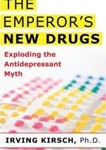I have recently read a very interesting book by Irving Kirsch, PhD. It’s called The Emperor’s New Drugs, and the central theme of the work is that antidepressants are only very slightly more effective than placebos (i.e. sugar pills), and that the difference is not clinically significant.
The logic is cogent and the research is rigorous. Read the book and decide for yourself.
Dr. Kirsch argues in favor of psychotherapy as a substitute for pills. And certainly talking is usually helpful. However, as long as depression is conceptualized as an illness, I don’t believe we will see real progress in this field.
Depression is not an illness. Depression is not an instance of something going wrong in an organism, but rather something going right. It is an adaptive response – a warning system (analogous to pain), alerting us to a need to make some changes in lifestyle.
The fact is that each person has within him or herself the resources needed to generate and maintain positive feelings. This is the essential point of the placebo research. It wasn’t the sugar pills (or the antidepressants) that generated the positive feelings. It was the individuals themselves starting to take appropriate corrective action in their lives.
The six natural antidepressants are:
– good nutrition
– fresh air
– sunshine
– physical activity, with frequent successes
– purposeful activity
– at least one good, open, honest relationship
When these factors are present in our lives to a significant degree, we feel generally positive; when one or more is largely absent, we feel down. These ideas are developed more fully in my post of July 28, 2009: Depression is not an Illness.
If you’re taking antidepressants, you owe it to yourself to read Dr. Kirsch’s book.

|
Irving Kirsch, Ph.D, The Bodley Head, 2009 |